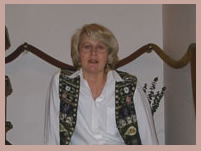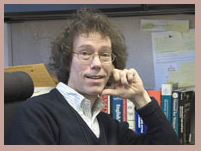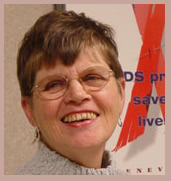About CDC
Hot Links
Conferences & Events
Outbreak: Plagues that changed HistorySeptember 27 – January 30, 2009
Organized by the Global Health Odyssey Museum; come see Byrn Barnard’s images of the symptoms and paths of the world’s deadliest diseases – and how the epidemics they spawned have changed history forever.
CDC Writer and Editors
CDC has about 85 writer-editors throughout the agency. They perform a wide variety of tasks typically associated with the profession: editing, copy-editing, and proofreading authors´ manuscripts. Some writer-editors are also involved in research, writing, design, layout, and printing; they produce brochures, flyers, manuals, journals, and websites for the agency. However, regardless of their job descriptions, all writer-editors have one common goal: to ensure that CDC disseminates health messages—both internally and externally—that are clearly written, scientifically accurate, and effective for the target audience.
Read on to meet some of CDC´s writer-editors.
Byron Breedlove, BA, MA

Senior writer-editor, Budget Formulation and Public Health Policy Branch, FMO; on detail to the Office of Strategy and Innovation (OSI) and the Futures Initiative
A former middle-school teacher and ESL instructor, Breedlove worked for a medical publishing company for five years before coming to CDC in 1987. Breedlove says he came to CDC because he wanted to work in a more academic and research-oriented organization.
"My work focuses on strategic communications for the Office of Strategy and Innovation, a position that involves writing, Web and publication development, and knowledge management. It´s an energized, vital work environment." Previously he served in a managing editor´s function for the Financial Management Office (FMO), Futures, OSI, Business Services Improvements (BSI), and President´s Management Agenda (PMA) websites.
Breedlove has served in various capacities: Managing editor of Chronic Disease Notes & Reports and as part of the team that produced Physical Activity and Health: A Report of the Surgeon General. In addition, he produced all five of CDC´s Chief Financial Officer´s Annual Reports before they were discontinued because of changes in HHS´ auditing practices. He has also developed websites for the Futures Initiative, OSI, FMO, PMA, BSI, and NCCDPHP.
"I feel that writer-editors are the custodians of vast institutional knowledge here at CDC, the type of general knowledge that disappears as more work is outsourced. We know the best practices for writing clearly, conveying the maximum information in the most efficient manner, and respecting the values of the agency and its staff."
Anne C. Hamilton

Technical Writer-Editor, NIOSH, Cincinnati, Ohio
"My career as a technical writer-editor began in 1965 at the Food and Drug Administration (FDA) and the Social Security Administration in Washington, DC. After a move to Cincinnati in 1969, I worked for a federal environmental agency and then freelanced for 16 years."
"I joined CDC in 1986 as the senior technical editor in a small publications group for NIOSH. We oversee the editing and publishing of documents from our own division as well as many other parts of NIOSH. My passion for public health has been strong since I began working for FDA. Our publications group is especially proud of helping to produce the Worker Health Chartbook, 2004, which has just been released. This 354-page document is a resource for technical and non-technical audiences with a need to know about occupational injury, illness, and death."
Rick Hull, PhD

Technical Publications Writer-Editor, Technical Information and Editorial Services Branch, NCCDPHP
"I was and—as Garrison Keillor will tell you—always will be, an English major. But after six years of teaching college students who mostly asked, "Will this be on the test?" or "Will this help me get into business school?" and after one wonderful year at a private high school, I decided I needed a career change. So, in 1987, I moved back to Atlanta to become a writer-editor at CDC. I was familiar with the agency because my aunt, Sarah Owens, started out as a GS-2 and became the first woman at CDC to reach GS-15 [when she left, she was the manager of personnel, MASO, and the mail room].
"I arrived at CDC at a pivotal time for writer-editors: desktop publishing was starting to revolutionize the field. It transformed us into co-creators with scientists and public health analysts. Gone were the days spent wearing out pencils and erasers over would-be journal articles and book chapters–now we were our own publishers, and we were taking health messages into the state and local health departments and even into the neighborhoods that needed them. Editing had become one with planning, writing, designing, and dissemination–as it always should have been."
"My transition from the ivory tower of academia to the ´real world´ was eased by my belief that I wasn´t working in the business world but rather in the inherently noncommercial world of the public health service. A-76 has made me reconsider the distinction between ´commercial´ and ´governmental.´ But at the end of the day, the important thing is that I can sleep easy at night, knowing I am still working for the public good."
Marie S. Morgan, BA, ELS

Technical Writer-Editor, Divisions of HIV/AIDS Prevention, NCHSTP
"I came to CDC in 1988, after 10 years as a freelance editor. Having known since my undergraduate days at the University of Georgia that I wanted to be an editor, I´m one of those lucky people whose work signifies both a fulfilled ambition and unflagging enthusiasm. The interest in medical editing may well be a tertiary effect of growing up with a brother who knew from age seven that he wanted to be a physician. Public health was only a short step, especially considering that I´ve known about CDC and admired the agency since my childhood in a small town in South Carolina."
"My primary work is editing papers for publication: journal submissions, book chapters, surveillance reports, fact sheets. I believe that data cannot stand alone–only when published can data contribute fully to scientific research or to public health measures that benefit millions, not only in the United States but worldwide. Contributing to the clarity of publications is satisfying and interesting, and the bonus is the opportunity to teach authors, through the edited paper and comments about it, the principles of good writing. For the past seven years, I´ve been fortunate to be able to expand that interest by teaching a series of classes in scientific writing to staff and EIS Officers in NCHSTP."
Page last modified: 2/7/2007

